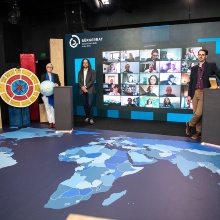Citizen participation is in vogue when it comes to negotiating climate change, refugee policies, and even the renovation of the local hospital. But what conditions must be met for a civic dialog to actually help reduce social polarization and bring politicians and citizens closer together? This is what researchers from the University of Stuttgart and their colleagues from six other countries investigate within the framework of the new EU project “EUComMeet”.
The citizens’ council “Germany’s Role in the World”, where about 150 random participants discussed the future of democracy in Germany in ten sessions, was under the patronage of Wolfgang Schäuble, the President of the Bundestag. The results have been presented to the German Bundestag on March 19, 2021 in the form of a report. The pan-European civic dialog “Europolis”, which took place in the run-up to the 2009 European elections, had far less impact. At that time, 348 citizens from all 27 EU member states spent a weekend in Brussels discussing migration policy and climate change. However, despite the enormous expense of EUR 10 million and very good organization, there was virtually no response from the political elites. “Whether a civic dialog brings about political action and can also arouse interest in the population, for example through the social media, depends not only on the quality of the discussions, but also on other factors such as political support and networking,” explains Prof. André Bächtiger from the Institute for Social Sciences at the University of Stuttgart. “In the EUComMeet project, we want to analyze in detail which factors these are.”
Examples of politically highly effective civic dialogs
In cooperation with partners from the University of British Columbia in Vancouver (Canada) and the platform for democratic innovation “Participedia”, the social scientist and his colleague at the institute Dr. Eva-Maria Trüdinger and doctoral researcher Seraphine Arnold, investigate under which conditions citizens’ forums achieved political and social impact and under which circumstances non-participating citizens consider recommendations from dialogic processes of citizen participation as legitimate. The focus of their research is not only on the civic dialogs “Germany’s Role in the World” and “Europolis”, but also on highly effective events such as the citizens’ councils in Ireland on same-sex marriage and the legalization of abortion. “These citizens’ councils were closely coupled with politics,” says Bächtiger.
In order to analyze the civic dialogs, the research team uses advanced experimental survey designs that are based on preliminary studies from the new ZIRIUS Participation and Deliberation Lab at the University of Stuttgart as well as a current project of the German Research Foundation (led by Prof. André Bächtiger) on citizens’ perceptions of legitimacy in dialogic participation processes. With a proactive research strategy, EUComMeet wants to develop new and innovative ways for citizens, politicians, and stakeholders from across Europe to better engage with each other.
About the EUComMeet project
The project EUComMeet (Developing Participatory Spaces Using a Multi-Stage, Multi-Level, Multi-Mode, Multi-Lingual, Dynamic Deliberative Approach - M4D2) is funded by the European Union with about EUR 3 million within the framework of the program “Horizont 2020”, and is coordinated at the University of Siena (Italy). The consortium includes interdisciplinary organizations with extensive experience in the design, management, and analysis of deliberative and participative processes: Agencia Estatal Consejo Superior de Investigaciones Cientificas (Spain); Åbo Akademi (Finnland); University of Warsaw (Poland); Dublin City University (Ireland); University of Stuttgart (Germany); Université Paris 8 - Vincennes Saint-Denis (France); Mission Publiques (France); Tuscan Organization of Universities and Research 4 Europe (Belgium). In addition, there are partners with extensive background knowledge about deliberative processes: the Collegio Carlo Alberto (Italy), the University of British Columbia (Canada), and the Center for Deliberative Democracy at Stanford University (California).
Expert Contact:
Prof. Dr. André Bächtiger, Institute for Social Sciences, Department of Political Theory and Empirical Democracy Research, Phone +49 711 685-81450, E-Mail


